Background
John Lowell was born on October 6, 1769 in Newburyport, Massachusetts, United States, the son of Judge John Lowell, 1743-1802, and his first wife, Sarah (Higginson) Lowell. He was a half-brother of Francis Cabot Lowell.


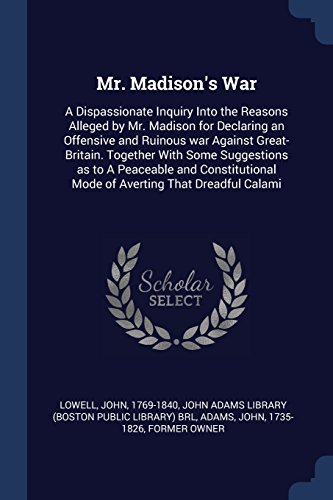
( This work has been selected by scholars as being cultur...)
This work has been selected by scholars as being culturally important, and is part of the knowledge base of civilization as we know it. This work was reproduced from the original artifact, and remains as true to the original work as possible. Therefore, you will see the original copyright references, library stamps (as most of these works have been housed in our most important libraries around the world), and other notations in the work. This work is in the public domain in the United States of America, and possibly other nations. Within the United States, you may freely copy and distribute this work, as no entity (individual or corporate) has a copyright on the body of the work. As a reproduction of a historical artifact, this work may contain missing or blurred pages, poor pictures, errant marks, etc. Scholars believe, and we concur, that this work is important enough to be preserved, reproduced, and made generally available to the public. We appreciate your support of the preservation process, and thank you for being an important part of keeping this knowledge alive and relevant.
https://www.amazon.com/Mr-Madisons-War-Dispassionate-Great-Britain/dp/1377032698?SubscriptionId=AKIAJRRWTH346WSPOAFQ&tag=prabook-20&linkCode=sp1&camp=2025&creative=165953&creativeASIN=1377032698
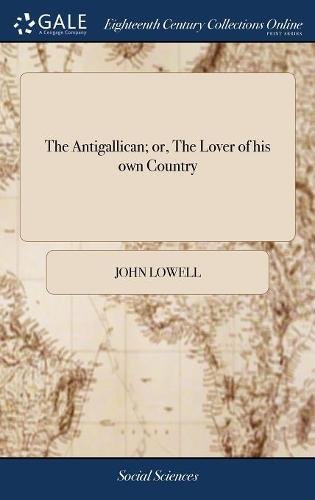
(The 18th century was a wealth of knowledge, exploration a...)
The 18th century was a wealth of knowledge, exploration and rapidly growing technology and expanding record-keeping made possible by advances in the printing press. In its determination to preserve the century of revolution, Gale initiated a revolution of its own: digitization of epic proportions to preserve these invaluable works in the largest archive of its kind. Now for the first time these high-quality digital copies of original 18th century manuscripts are available in print, making them highly accessible to libraries, undergraduate students, and independent scholars. Delve into what it was like to live during the eighteenth century by reading the first-hand accounts of everyday people, including city dwellers and farmers, businessmen and bankers, artisans and merchants, artists and their patrons, politicians and their constituents. Original texts make the American, French, and Industrial revolutions vividly contemporary. ++++ The below data was compiled from various identification fields in the bibliographic record of this title. This data is provided as an additional tool in helping to insure edition identification: ++++ British Library W037803 Attributed to John Lowell by Gaines, who supplies 1798 as the actual date of publication. Gaines notes two states of gathering I: in one, p. 70 is misnumbered 67; in the other, p. 72 is misnumbered 71. "French influence. No. I-VIII."--p. 5-28; "Fren Philadelphia: Published by William Cobbett, opposite Christ Church, December, 1797 i.e., 1798 73, 2,74-82, 2p.; 8°
https://www.amazon.com/Antigallican-Lover-His-Own-Country/dp/1379341396?SubscriptionId=AKIAJRRWTH346WSPOAFQ&tag=prabook-20&linkCode=sp1&camp=2025&creative=165953&creativeASIN=1379341396
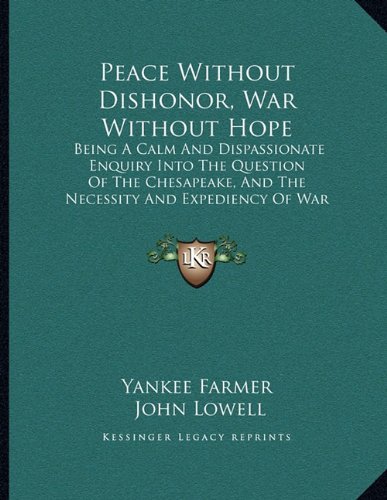
(This scarce antiquarian book is a facsimile reprint of th...)
This scarce antiquarian book is a facsimile reprint of the original. Due to its age, it may contain imperfections such as marks, notations, marginalia and flawed pages. Because we believe this work is culturally important, we have made it available as part of our commitment for protecting, preserving, and promoting the world's literature in affordable, high quality, modern editions that are true to the original work.
https://www.amazon.com/Peace-Without-Dishonor-Hope-Dispassionate/dp/1165521768?SubscriptionId=AKIAJRRWTH346WSPOAFQ&tag=prabook-20&linkCode=sp1&camp=2025&creative=165953&creativeASIN=1165521768
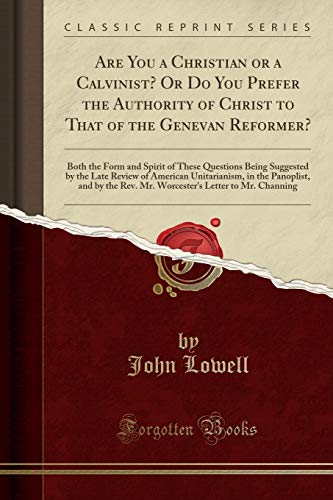
(Excerpt from Are You a Christian or a Calvinist? Or Do Yo...)
Excerpt from Are You a Christian or a Calvinist? Or Do You Prefer the Authority of Christ to That of the Genevan Reformer?: Both the Form and Spirit of These Questions Being Suggested by the Late Review of American Unitarianism, in the Panoplist, and by the Rev. Mr. Worcester's Letter to Mr. Channing Now what does this involve? Not only, that you believe the apostles inspired, but that every clerk and copyist (whether slave or monk) was also inspired; that even the orthodox men, who made the interpolations to suit their dogmas, were inspired and that all the bishops and divines who made the translation were inspired. I introduce this point first, because it comes first in order. The orthodox also maintain, that certain opinions and speculations, not to be found in the scripture, but which Calvin declared he believed were intended to be placed there, or pretended that he discovered in them, and certain other opinions, held by an assembly of Divines in Great Britain, are to be received as the rule of our faith; however impossible we may find it to understand such doctrines, and even if upon the most accurate examination and impar tial inquiry we shall be convinced, that no such doctrines are contained in the scriptures. The real point, and the only point, of difference between those who are called the liberal clergy and the orthodox, rests on this ground. The orthodox believe in Calvin and the Westminster Assembly; the liberal christians in Christ and his apos tles. The former are Calvinists - the latter, Christians. Yet so intolerant and unreasonable are the party who have arrogated to themselves the title of orthodox, that they venture to deny the name and title of christians to the fol lowers of Christ, and apply it exclusively to the followers of Calvin and of human councils, assemblies, and creed makers. About the Publisher Forgotten Books publishes hundreds of thousands of rare and classic books. Find more at www.forgottenbooks.com This book is a reproduction of an important historical work. Forgotten Books uses state-of-the-art technology to digitally reconstruct the work, preserving the original format whilst repairing imperfections present in the aged copy. In rare cases, an imperfection in the original, such as a blemish or missing page, may be replicated in our edition. We do, however, repair the vast majority of imperfections successfully; any imperfections that remain are intentionally left to preserve the state of such historical works.
https://www.amazon.com/Christian-Calvinist-Authority-Genevan-Reformer/dp/133154081X?SubscriptionId=AKIAJRRWTH346WSPOAFQ&tag=prabook-20&linkCode=sp1&camp=2025&creative=165953&creativeASIN=133154081X
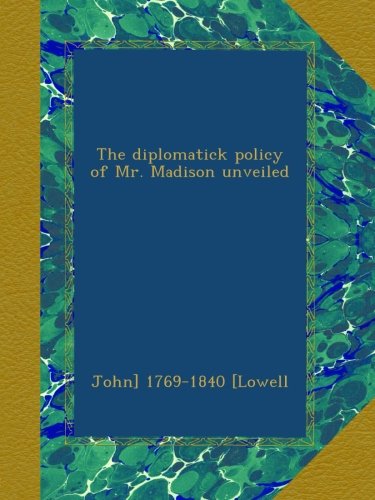
(This book was originally published prior to 1923, and rep...)
This book was originally published prior to 1923, and represents a reproduction of an important historical work, maintaining the same format as the original work. While some publishers have opted to apply OCR (optical character recognition) technology to the process, we believe this leads to sub-optimal results (frequent typographical errors, strange characters and confusing formatting) and does not adequately preserve the historical character of the original artifact. We believe this work is culturally important in its original archival form. While we strive to adequately clean and digitally enhance the original work, there are occasionally instances where imperfections such as blurred or missing pages, poor pictures or errant marks may have been introduced due to either the quality of the original work or the scanning process itself. Despite these occasional imperfections, we have brought it back into print as part of our ongoing global book preservation commitment, providing customers with access to the best possible historical reprints. We appreciate your understanding of these occasional imperfections, and sincerely hope you enjoy seeing the book in a format as close as possible to that intended by the original publisher.
https://www.amazon.com/diplomatick-policy-Mr-Madison-unveiled/dp/B00AUSE3TQ?SubscriptionId=AKIAJRRWTH346WSPOAFQ&tag=prabook-20&linkCode=sp1&camp=2025&creative=165953&creativeASIN=B00AUSE3TQ
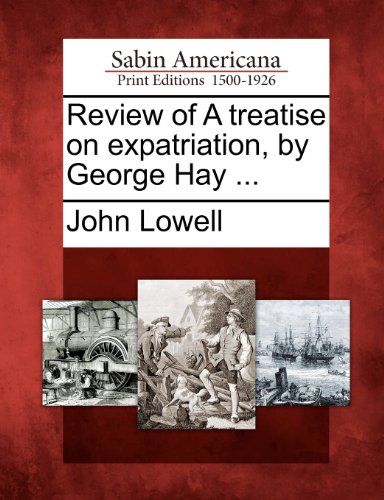
( Title: Review of A treatise on expatriation, by George ...)
Title: Review of A treatise on expatriation, by George Hay ... Author: John Lowell Publisher: Gale, Sabin Americana Description: Based on Joseph Sabin's famed bibliography, Bibliotheca Americana, Sabin Americana, 1500--1926 contains a collection of books, pamphlets, serials and other works about the Americas, from the time of their discovery to the early 1900s. Sabin Americana is rich in original accounts of discovery and exploration, pioneering and westward expansion, the U.S. Civil War and other military actions, Native Americans, slavery and abolition, religious history and more. Sabin Americana offers an up-close perspective on life in the western hemisphere, encompassing the arrival of the Europeans on the shores of North America in the late 15th century to the first decades of the 20th century. Covering a span of over 400 years in North, Central and South America as well as the Caribbean, this collection highlights the society, politics, religious beliefs, culture, contemporary opinions and momentous events of the time. It provides access to documents from an assortment of genres, sermons, political tracts, newspapers, books, pamphlets, maps, legislation, literature and more. Now for the first time, these high-quality digital scans of original works are available via print-on-demand, making them readily accessible to libraries, students, independent scholars, and readers of all ages. ++++ The below data was compiled from various identification fields in the bibliographic record of this title. This data is provided as an additional tool in helping to insure edition identification: ++++ SourceLibrary: Huntington Library DocumentID: SABCP02124900 CollectionID: CTRG96-B3606 PublicationDate: 18140101 SourceBibCitation: Selected Americana from Sabin's Dictionary of books relating to America Notes: Collation: 39 p. ; 24 cm
https://www.amazon.com/Review-treatise-expatriation-George-Hay/dp/1275703828?SubscriptionId=AKIAJRRWTH346WSPOAFQ&tag=prabook-20&linkCode=sp1&camp=2025&creative=165953&creativeASIN=1275703828
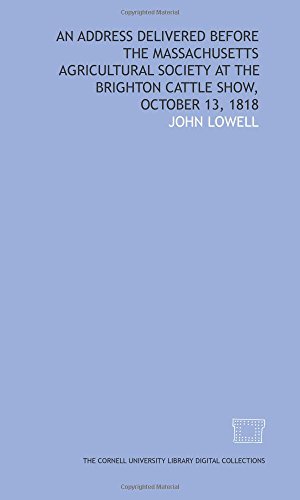
(This volume is produced from digital images from the Corn...)
This volume is produced from digital images from the Cornell University Library Samuel J. May Anti-Slavery Collection
https://www.amazon.com/Address-delivered-Massachusetts-Agricultural-Brighton/dp/1429709545?SubscriptionId=AKIAJRRWTH346WSPOAFQ&tag=prabook-20&linkCode=sp1&camp=2025&creative=165953&creativeASIN=1429709545

(Excerpt from Life and Letters of George Cabot A sentimen...)
Excerpt from Life and Letters of George Cabot A sentiment of respect for the memory of my great grandfather, and a desire to rescue his name if possible from complete oblivion, induced me to undertake the work of which this volume is the result. The difficulties in my way at first seemed insurmountable. Mr. Cabot, shortly before his death, made an almost complete destruction of all his letters and papers; and I had, therefore, no material for a biography in the best sense of the word. Mr. Cabot's correspondents, however, had preserved his letters; and examination led me to believe that they were of consider able historical value. Selections from these letters form the principal part of this volume. Being debarred by the nature of my only materials from writing a suitable biog raphy, and not considering that a history of any period could be properly treated in a work relating exclusively to an individual, I was forced to confine myself to the task of simply editing those letters which seemed to merit publication. With this object, I have prefixed to each chapter a short account of Mr. Cabot's public life, and of such events as happened during the period covered by the letters and alluded to in them. These introductory passages and the notes as well have been written with the sole purpose of rendering the accompanying letters intelligible. About the Publisher Forgotten Books publishes hundreds of thousands of rare and classic books. Find more at www.forgottenbooks.com This book is a reproduction of an important historical work. Forgotten Books uses state-of-the-art technology to digitally reconstruct the work, preserving the original format whilst repairing imperfections present in the aged copy. In rare cases, an imperfection in the original, such as a blemish or missing page, may be replicated in our edition. We do, however, repair the vast majority of imperfections successfully; any imperfections that remain are intentionally left to preserve the state of such historical works.
https://www.amazon.com/Letters-George-Cabot-Classic-Reprint/dp/1330730461?SubscriptionId=AKIAJRRWTH346WSPOAFQ&tag=prabook-20&linkCode=sp1&camp=2025&creative=165953&creativeASIN=1330730461
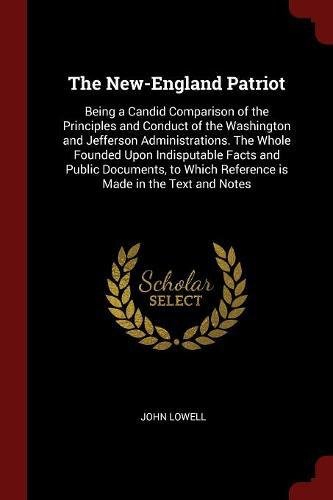
( This work has been selected by scholars as being cultur...)
This work has been selected by scholars as being culturally important, and is part of the knowledge base of civilization as we know it. This work was reproduced from the original artifact, and remains as true to the original work as possible. Therefore, you will see the original copyright references, library stamps (as most of these works have been housed in our most important libraries around the world), and other notations in the work. This work is in the public domain in the United States of America, and possibly other nations. Within the United States, you may freely copy and distribute this work, as no entity (individual or corporate) has a copyright on the body of the work. As a reproduction of a historical artifact, this work may contain missing or blurred pages, poor pictures, errant marks, etc. Scholars believe, and we concur, that this work is important enough to be preserved, reproduced, and made generally available to the public. We appreciate your support of the preservation process, and thank you for being an important part of keeping this knowledge alive and relevant.
https://www.amazon.com/New-England-Patriot-Comparison-Principles-Administrations/dp/1375804197?SubscriptionId=AKIAJRRWTH346WSPOAFQ&tag=prabook-20&linkCode=sp1&camp=2025&creative=165953&creativeASIN=1375804197
John Lowell was born on October 6, 1769 in Newburyport, Massachusetts, United States, the son of Judge John Lowell, 1743-1802, and his first wife, Sarah (Higginson) Lowell. He was a half-brother of Francis Cabot Lowell.
Lowell graduated from Phillips Andover and then from Harvard in 1786. After studying law, he was admitted to the bar in 1789.
Lowell acquired a wide and lucrative law practice. He ably represented Boston in the Massachusetts legislature from 1798 to 1800. His active professional career ended in 1803, when, his health broken through overwork, he went abroad for a three-year rest. Already he had amassed a sufficient fortune to retire for the remainder of his life.
After his return to Massachusetts in 1806 he took an active part in the political controversies of the day, writing vigorous pamphlets and letters to the press. An expression in one of his papers gained him the sobriquet of "the little Rebel" or "the Boston Rebel. " He was consequently and with some justification regarded as a secessionist, but he denied the allegation. His Review of a Treatise on Expatriation by George Hay Esquire (1814) is said to have been influential in persuading the government not to retaliate for the death of three British deserters captured in the Chesapeake affair. Henry Adams resentative" of Timothy Pickering, and their correspondence indicates that Pickering often dictated Lowell's political views. Because of his failure to sign his writings and his distaste for publicity it is difficult to estimate his importance. Unquestionably influential in New England, his pamphlets seem to have been generally unknown elsewhere. From 1810 to 1822 he was a member of the Harvard Corporation; from 1823 to 1827, an Overseer.
After his retirement he quietly gave both money and legal services to those in need. His religious articles were widely read; his contributions to the current controversy about the constitutions of the Massachusetts Congregational churches were considered valuable. His writing, clear, forceful, and carefully argued, was praised by such men as Edward Everett, John Jay, and John Marshall.
Lowell was best known as a Federalist pamphlet writer. His most famous works were Mr. Madison's War (1812); Are You a Christian or a Calvinist? (1815); An Address Delivered Before the Massachusetts Agricultural Society (1818). He was also a founder of the Massachusetts General Hospital and the Provident Institution for Savings.
(Excerpt from Are You a Christian or a Calvinist? Or Do Yo...)
(Excerpt from Life and Letters of George Cabot A sentimen...)
(The 18th century was a wealth of knowledge, exploration a...)
(This book was originally published prior to 1923, and rep...)
( This work has been selected by scholars as being cultur...)
( This work has been selected by scholars as being cultur...)
(This volume is produced from digital images from the Corn...)
(This scarce antiquarian book is a facsimile reprint of th...)
( Title: Review of A treatise on expatriation, by George ...)
(Boston 1809 T. B .Wait. Octavo., 50pp., original printed ...)
Lowell supported the Federalist point of view and opposed the Embargo, Madison, the "French alliance, " and the War of 1812. He opposed the Hartford Convention because "it would not go far enough".
Lowell was an influential member of the Boston Athenæum, Massachusetts Agricultural Society, Massachusetts Historical Society, and American Antiquarian Society.
Lowell was a scientific farmer and cattle-breeder, a competent botanist, and a frequent contributor to the New England Farmer. On his Roxbury farm he had some of the finest greenhouses in the country, the first to be built on truly scientific principles. He loved farming, and "wanted only to be known as the 'Norfolk Farmer'".
On June 8, 1793, Lowell married Rebecca Amory. Through his son John Amory Lowell he was the grandfather of John Lowell, 1824-1897 and the great-grandfather of Amy, and Abbott Lawrence Lowell.
